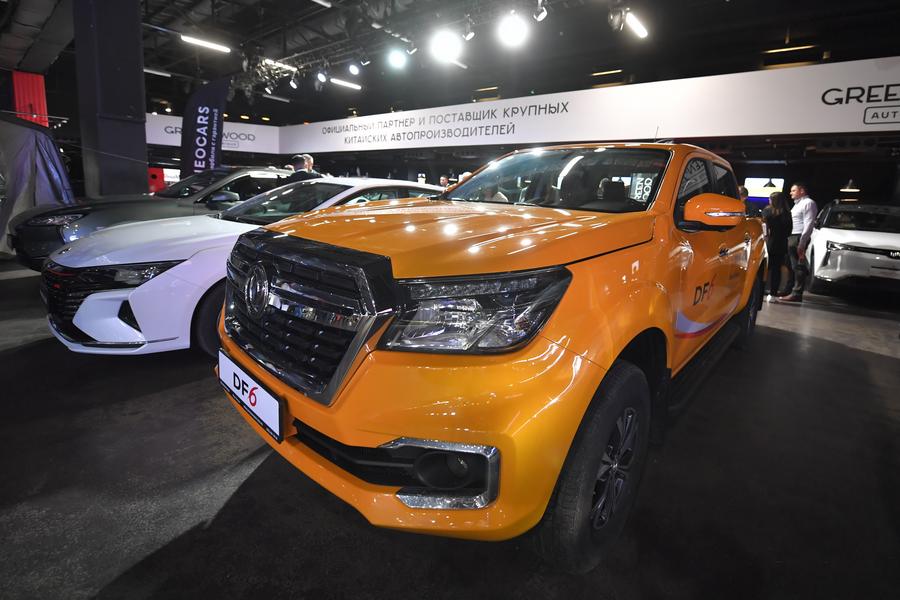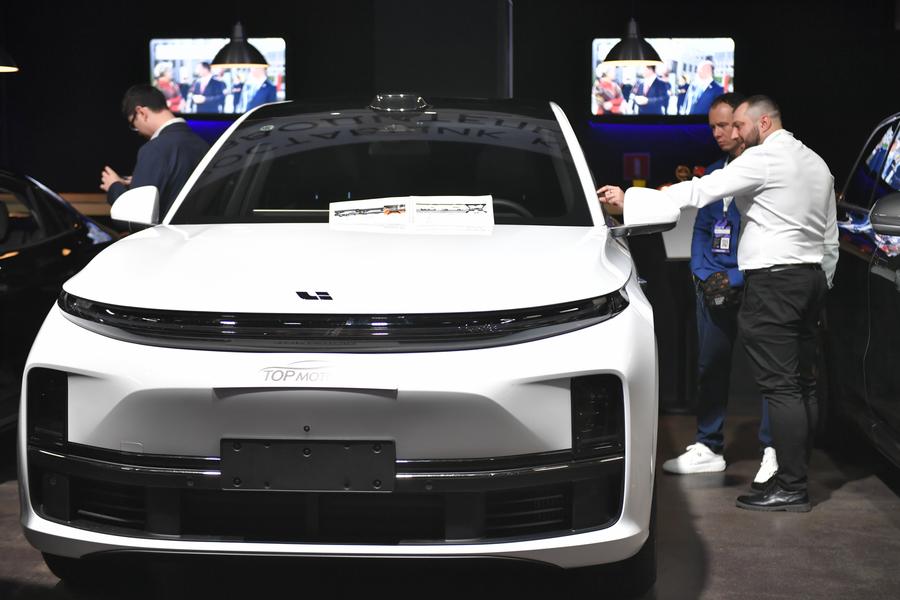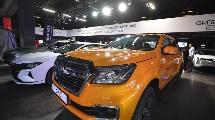
A vehicle from Chinese car brand Dongfeng Motor stands on display during the CarX exhibition-forum in Moscow, Russia, on Oct. 10, 2023. (Photo by Alexander Zemlianichenko Jr/Xinhua)
Russia has seen continuous growth in Chinese car sales in recent years. Chinese cars are known for their affordability and increasingly competitive quality, which has contributed to their growing popularity among local consumers.
by An Xiaomeng
ST. PETERSBURG, Jan. 22 (Xinhua) -- Last year, Chinese car sales set a historic record in Russia, gaining almost half of the country's auto market share. Chinese automakers have been making inroads into the Russian market with a new image.
Russia has seen continuous growth in Chinese car sales in recent years. Chinese cars are known for their affordability and increasingly competitive quality, which has contributed to their growing popularity among local consumers.
Insiders believe that the hot sales of Chinese cars are the result of years of efforts to improve quality and localization, though the Western sanctions also played a role.
STRONG COMPETITIVENESS
Chinese automakers made their initial entry into the Russian market in the early 21st century, but challenges like weak brand image and fierce competition prevented them from taking root in the market, and only a few survived.
In recent years, Chinese automakers have absorbed the world's leading experts in the automotive field and continuously improved their technology. Substantial investments in research and development (R&D) have propelled China's auto industry into rapid growth, solidifying its position as a manufacturing powerhouse.
Igor Morzharetto, deputy editor-in-chief of the Russian auto magazine "Behind the Wheel," said that Chinese automobile companies have proven themselves with impressive performance. Consumers, once skeptical of Chinese cars, are starting to change their attitudes after trying them.

Visitors look at a car from Chinese car brand Li Auto during the CarX exhibition-forum in Moscow, Russia, on Oct. 10, 2023. (Photo by Alexander Zemlianichenko Jr/Xinhua)
Morzharetto said that China's auto industry has achieved "amazing results," and with continuous improvements in quality and product range, Chinese manufacturers would be able to compete with global industry leaders.
Currently, most Chinese cars sold in Russia fall within the middle price range. Analysts pointed out that compared with other cars of the same price level, Chinese cars often boast more fashionable exterior designs and more interesting configurations, achieving a balance in terms of decoration, price and technology.
Moreover, Chinese brands stand out by offering longer warranty periods or mileage, reaching up to 7 years or 200,000 km.
"Many customers prefer the new Chinese brands to outdated European and Korean ones now," said Alejandro Carreno, CEO of RexRent, one of Russia's largest car rental companies. "I'm confident that within two to three years, the perception of Chinese brands and trust in them will be further reinforced."
LOCALIZED PRODUCTION
The Russian auto industry has long relied heavily on foreign technology. Domestic producers are now experiencing difficulties due to disruptions in the supply chain amid sanctions. Enterprises that took over factories vacated by Western automakers are also unable to resume production.
Local media reported that Russian auto production almost collapsed in 2022, and the only way to save the factories was to localize Chinese cars.
Haval stands as the only Chinese automaker with a wholly-owned full-cycle plant in Russia. Russian companies have begun to seek cooperation with other Chinese firms to assemble Chinese cars.
Some models of China's Kaiyi and BAIC were put into production last year at the Russian Avitotor plant in Kaliningrad, which previously produced cars of BMW, Kia and Hyundai Motors; the former Volkswagen plant in Kaluga started production of Chery-branded cars.
Moskvich, a long-established Soviet-era car company, and the former Nissan factory in St. Petersburg have also begun assembling Chinese cars under their own brands. Evolute, created in March 2022, mainly assembles Chinese EVs as well.
Several other former Western factories in Russia are in negotiations with Chinese partners at the moment and are expected to resume production this year.
Chinese automakers play a key role in the recovery of the Russian auto industry. Russian industry analysts asserted that in the coming years, the future of the Russian auto industry will be tied to Chinese manufacturers.
DEMAND SURGE
Western sanctions against Russia have boosted demand for Chinese cars since the Ukraine crisis started. After the mass exodus of South Korean, Japanese, European and U.S. carmakers, the Russian auto market is poised to embrace the products of the Chinese automotive industry.
A recent study by the auto business unit of Russia's Otkritie Bank showed that Chinese automakers achieved a record sales total of 553,000 cars in Russia in 2023, accounting for 49 percent of the country's auto market, with the share of Chinese cars in the Russian market more than doubling from the year before.

Visitors check the interior of a vehicle from Chinese car brand Zeekr during the CarX exhibition-forum in Moscow, Russia, on Oct. 10, 2023. (Photo by Alexander Zemlianichenko Jr/Xinhua)
Chinese car brands have sprung up in Russia over the past year. According to the auto business unit of Otkritie Bank, 30 Chinese car brands were officially imported by distributors and an additional 15 to 17 brands entered the Russian market through parallel imports, a trade channel through which branded goods are imported into a market and sold there without the trademark owner's consent.
The best-selling Chinese car brands remained traditionally Haval, Chery and Geely.
In addition to ordinary consumers, major Russian taxi companies and car-sharing companies, including Yandex, have made large purchases of Chinese crossovers for fleet renewal.
RexRent reported that Chinese cars have become Russia's most popular rental cars; the share of Chinese cars in its fleet soared from 3.7 percent in 2022 to 40.8 percent in 2023.
Chinese cars also dominate Russia's electric vehicle (EV) segment. The best-selling brand was ZEEKR from China, followed by local brand Evolute.
The Russian government began to promote the use of domestically produced cars as official vehicles last year. In addition to domestic brands such as Lada and Moskvich, the Russian Ministry of Industry and Trade also included models of the Chinese brand Haval in the government's priority purchase list.
Despite a surge in Chinese car prices due to rising costs, industry analysts still believe that Chinese automakers will sell more cars in Russia this year.




 A single purchase
A single purchase









